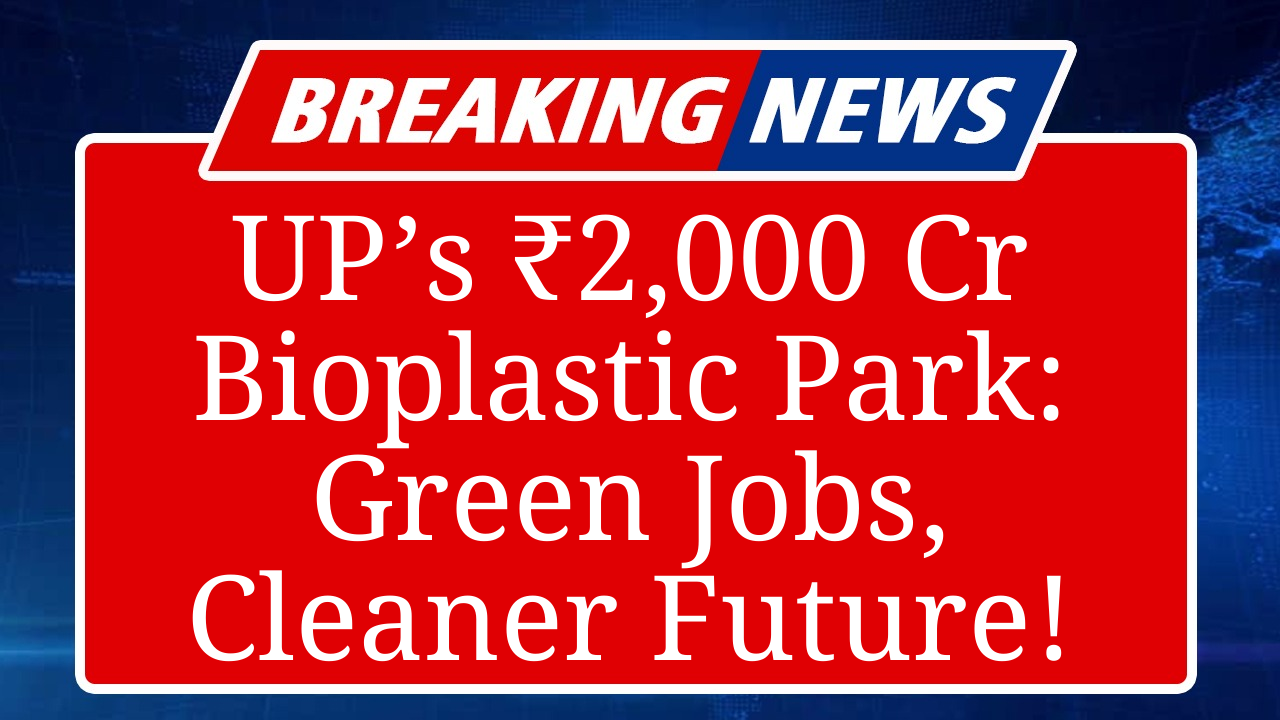Uttar Pradesh’s first bioplastic park in Lakhimpur Kheri, set to be developed at a cost of ₹2,000 crore, aims to combat plastic pollution and create thousands of jobs. Spanning 1,000 hectares, the park will produce biodegradable plastics from renewable sources like corn and sugarcane, fostering sustainable technology and economic growth in the region.
UP’s Ambitious Bioplastic Park to Transform Economy and Environment
In a significant move to address environmental pollution and boost economic development, the Uttar Pradesh government has sanctioned a ₹2,000 crore bioplastic park in Kumbhi village, Gola Gokarannath tehsil, Lakhimpur Kheri district. The project, spearheaded by Balrampur Chini Mills under a public-private partnership (PPP) model, will span 1,000 hectares and is expected to be a game-changer for sustainable manufacturing in India. The Uttar Pradesh Expressways Industrial Development Authority (UPEIDA) has been appointed as the nodal agency to oversee the park’s development, with Chief Minister Yogi Adityanath directing officials to expedite its completion.
The bioplastic park will focus on producing biodegradable plastics made from renewable resources such as corn, sunflower, sugar beet, and agricultural waste like potato and corn starch. Unlike conventional petroleum-based plastics, which contribute to long-lasting environmental pollution due to their non-biodegradable nature, bioplastics decompose naturally, reducing landfill waste and marine pollution. This initiative aligns with global efforts to transition to a circular economy, where resources are reused and recycled to minimize environmental impact.
The park is projected to create thousands of direct and indirect jobs, particularly in scientific, technical, and manufacturing sectors. It will also stimulate the local economy by fostering the growth of ancillary industries, such as those involved in raw material supply, processing, and waste management. The state government envisions the park as a hub for innovation, where scientists and researchers will develop cutting-edge technologies to enhance bioplastic production and recycling processes. These advancements are expected to address challenges such as the high production costs and limited mechanical properties of bioplastics, like brittleness and water permeability, which have hindered their widespread adoption.
Bioplastics are gaining traction globally as a sustainable alternative to traditional plastics, which are responsible for over 300 million tonnes of waste annually, with only 9% being recycled. The Uttar Pradesh bioplastic park will leverage India’s abundant agricultural resources to produce eco-friendly materials, reducing the carbon footprint by approximately 80% compared to petrochemical plastics. Moreover, bioplastics require 65% less energy to manufacture, making them an energy-efficient solution for industries like food packaging, agriculture, and consumer goods.
The project also aims to tackle plastic pollution by developing technologies to recycle contaminated plastics and improve waste management systems. For instance, compostable bioplastics produced at the park can be processed in industrial composting facilities, returning nutrients to the soil and supporting sustainable agricultural practices. However, challenges remain, including the need for standardized labeling, enhanced composting infrastructure, and consumer education to ensure proper disposal and maximize environmental benefits.
The initiative has garnered attention as part of Uttar Pradesh’s broader commitment to environmental sustainability, complementing national campaigns like Swachh Bharat Abhiyan. By replacing petroleum-based plastics with biodegradable alternatives, the park is expected to significantly reduce plastic pollution in the state, which has long grappled with waste management issues. Industry experts predict that the global bioplastics market, currently less than 2% of the total plastics market, will grow to 7.4 million tonnes by 2028, and Uttar Pradesh’s bioplastic park positions the state as a leader in this emerging sector.
The project’s emphasis on research and development will also address criticisms of bioplastics, such as their potential to compete with food production due to reliance on agricultural feedstocks. By exploring second-generation feedstocks like agricultural waste and microalgae, the park aims to minimize land use concerns and enhance sustainability. Collaborative efforts between policymakers, industry stakeholders, and research institutions will be crucial to overcoming these challenges and scaling up production to meet growing demand.
Disclaimer: This article is based on information from recent news reports, government releases, and industry analyses available on the web, including sources like Hindustan Times, The Indian Express, and Times of India. The data reflects the most current information as of September 2025. Readers are advised to verify details with official sources for the latest updates.

